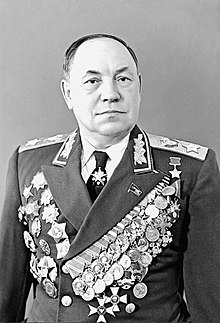Matwei Wassiljewitsch Sakharov

Matvei Zakharov ( Russian Матвей Васильевич Захаров ., Scientific transliteration Matvej Vasil'evič Zacharov * August 5 jul. / 17th August 1898 greg. In Woilowo in Staritsa , Tver province , Russian Empire ; † 31 January 1972 in Moscow ) was Chief of the Soviet General Staff and Marshal of the Soviet Union .
Life
Sakharov was born the youngest of six children to a simple farming family. Despite his upbringing by the village priest, he was critical of religion, but was otherwise a model student. In 1913 he followed his older brother to Moscow, where he initially worked as a shipyard worker. Dismissed after changing his company for political agitation, he became a supporter of the Bolsheviks in 1916 , joined the Red Guards in Petrograd in 1917 and took part in the storming of the Winter Palace . In 1918 he was accepted into the Red Army and initially sent to the artillery school. He then served as a battery commander in the civil war . In 1919 he was baptized by fire during the January offensive against the White Army . He proved himself and was given command of a combat group.
A short course at the staff academy in Moscow in 1919 brought to light his special aptitude for staff service, which he was able to prove immediately afterwards in the staff of a brigade during the fighting for Tsaritsyn . During further missions on the Black Sea and in the North Caucasus, he got to know the "Tsaritsyn Group", a conspiratorial clique of adventurers, including Stalin and the later marshals of the Soviet Union Budyonny and Voroshilov .
After the end of the civil war, Sakharov worked in staff functions until he was assigned to the general staff course at the military academy "MW Frunze" in 1925 . There he met Rodion Malinowski and returned to the troupe after three years with an excellent rating. At first he served on the staff of the Belarusian military district under Jegorow and Uborewitsch . After a brief command of a rifle regiment of the 8th Rifle Division, he was again appointed to the Frunze Academy to participate in the first course of the new military academy of the General Staff of the Armed Forces of the USSR "KJ Voroshilov" , an institution that is a valuable counterweight to the no longer up-to-date ideas of Budyonny and Voroshilov, whom Stalin trusted technically, developed. From 1937 until the beginning of the war, Sakharov served in several staffs, the most valuable use being that in the general staff under Shaposhnikov . After the beginning of the war against Germany , Sakharov was appointed Chief of Staff of the Northwest Front on July 10, 1941 , returned to the General Staff in August, but was soon able to return to the troops at his own request. Initially deployed on various fronts in the supply management, he worked in 1945 under Malinowski as chief of staff and with this he also led the campaign against Japan under the overall leadership of Wassilewski .
In September 1945 Sakharov returned to Moscow, where he took over the military academy of the General Staff of the Armed Forces of the USSR "KJ Voroshilov" , which was orphaned after the death of Shaposhnikov . During the four years of his activity he adjusted teaching staff and curricula to the changed forms of combat and received the title of professor. In the following eight years he worked as chief of training in the general staff, as inspector general of the army and as commander of the Leningrad military district. First appreciated by Khrushchev , he became Minister of Defense in 1955. In 1957 he took command of the Group of the Soviet Armed Forces in Germany (GSSD) and in 1959 became Marshal of the Soviet Union. In 1960 he followed Sokolowski as chief of staff and worked with Malinowski on downsizing and modernizing the armed forces. Khrushchev's adventurous Cuban policy was criticized by Sakharov, which helped to cool the relationship and limited him to the function of commander of the military academy of the General Staff, which Khrushchev also wanted to dissolve. After Khrushchev's fall, Sakharov returned as chief of the general staff and was assigned new important areas with the areas of disarmament and international military aid. The control of the MWD over the army's secret service GRU, controlled by the general staff , remained a permanent problem . In the later 1950s Sakharov's health began to deteriorate, in addition to diabetes, cancer also developed, which forced him to retire on September 21, 1971. After Sakharov's death, his urn was buried on the Kremlin wall in Moscow.
Web links
- Захаров Матвей Васильевич , warheroes.ru (Russian)
- Захаров Матвей Васильевич , encyclopedia.mil.ru (Russian)
literature
- Richard Woff: Matvei Vasilievich Zakharov , in: Harold Shukman : Stalin's Generals (New York 1993).
- BZ Gryaznow: Marshal Sakharov (Moscow 1979) - (Russian).
| personal data | |
|---|---|
| SURNAME | Sakharov, Matwei Wassiljewitsch |
| ALTERNATIVE NAMES | Матвей Васильевич Захаров (Russian) |
| BRIEF DESCRIPTION | Soviet officer, most recently Marshal of the Soviet Union |
| DATE OF BIRTH | 17th August 1898 |
| PLACE OF BIRTH | Woilowo, Tver Governorate |
| DATE OF DEATH | January 31, 1972 |
| Place of death | Moscow |